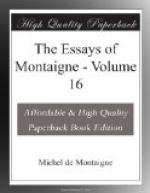["The curtains, though the sun should scorch the spectators, are drawn in, when Hermogenes appears."-Martial, xii. 29, 15. M. Tigellius Hermogenes, whom Horace and others have satirised. One editor calls him “a noted thief,” another: “He was a literary amateur of no ability, who expressed his critical opinions with too great a freedom to please the poets of his day.” D.W.]
The network also that was set before the people to defend them from the violence of these turned-out beasts was woven of gold:
“Auro
quoque torts refulgent
Retia.”
["The woven nets are
refulgent with gold.”
—Calpurnius, ubi supra.]
If there be anything excusable in such excesses as these, it is where the novelty and invention create more wonder than the expense; even in these vanities we discover how fertile those ages were in other kind of wits than these of ours. It is with this sort of fertility, as with all other products of nature: not that she there and then employed her utmost force: we do not go; we rather run up and down, and whirl this way and that; we turn back the way we came. I am afraid our knowledge is weak in all senses; we neither see far forward nor far backward; our understanding comprehends little, and lives but a little while; ’tis short both in extent of time and extent of matter:
“Vixere fortes ante Agamemnona
Mufti, sed omnes illacrymabiles
Urgentur, ignotique longs
Nocte.”
[ Many brave men lived before
Agamemnon, but all are pressed by the
long night unmourned and unknown.”—Horace,
Od., iv. 9, 25.]
“Et supra bellum
Thebanum et funera Trojae
Non alias alii quoque res cecinere
poetae?”
["Why before the Theban war and the destruction of Troy, have not other poets sung other events?”—Lucretius, v. 327. Montaigne here diverts himself m giving Lucretius’ words a construction directly contrary to what they bear in the poem. Lucretius puts the question, Why if the earth had existed from all eternity, there had not been poets, before the Theban war, to sing men’s exploits. —Coste.]
And the narrative of Solon, of what he had learned from the Egyptian priests, touching the long life of their state, and their manner of learning and preserving foreign histories, is not, methinks, a testimony to be refused in this consideration:
“Si interminatam in omnes partes magnitudinem regionum videremus et temporum, in quam se injiciens animus et intendens, ita late longeque peregrinatur, ut nullam oram ultimi videat, in qua possit insistere: in haec immensitate . . . infinita vis innumerabilium appareret fomorum.”
["Could we see on all parts the unlimited magnitude of regions and of times, upon which the mind being intent, could wander so far and wide, that no limit is to be seen, in which it can bound




